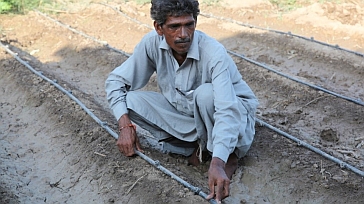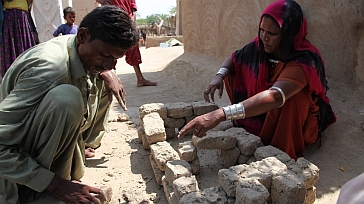Our impact, their voice
After the flood: Turning disaster into opportunity
Following the devastating floods in Pakistan’s rural Sindh province, the International Labour Organization joined the United Nations to help thousands of families put their lives back on track.

The 39-year-old woman and her husband, Nursing, lived with their four children in Sajhhearar Khaskheli village in Sindh province, the area of Pakistan that was most severely affected when a massive cascade of water swept from north to south, submerging one-fifth of the country.
The Sindh province was devastated, with some 970,000 households suffering damage and agricultural losses estimated at US$2.3 billion.
The floods destroyed the family’s house and livestock, and took away Nursing’s livelihood. From being a sharecropper (a tenant farmer who gives a share of the crops raised to the landlord in lieu of rent), he became a day labourer. The family’s future looked uncertain.
Gena wanted to help her family. So, she was delighted to hear of the training programme that was being organized for women in her village, to help them earn money.
The programme was initiated by the One UN Project for the Livelihood Restoration, Protection and Sustainable Empowerment of Vulnerable Peasant Communities in Sindh Province (LRP) and funded by the United Nations Trust Fund on Human Security (UNTFHS).
One of the skills taught was making embroidery using sewing machines: “I was a good student and learnt the machine embroidery quickly. After the training, I was given a sewing machine to carry out embroidery,” said Gena.
Next, the ILO offered to link women up with micro-credit opportunities, to help them start small enterprises. Gena took a loan of Rs10,000 (US$100) and opened a little shop to sell household items.
Gena’s work now brings the family Rs1,000 (US$10) a month. Through the programme she has also learned to be better prepared for any future floods. She learned, for example, how to ensure the house walls are strong, to build a raised platform for cooking and for keeping grain dry, and to keep their children safe and healthy by ensuring they are clean and wash their hands before they eat.

Gena’s and Nursing’s village neighbours have also benefited from the skills training programme, which was initiated by the ILO and its partner organization, the Heritage Foundation of Pakistan.
Champa’s rise to success
50-year-old Kanji and his wife, Champa, were among a group of farm workers who were also affected by the floods. Their lives were transformed a second time, in 2014, by green skills training that taught them to build fuel efficient, smokeless, and disaster resilient earthen stove-kitchens, known as Swissopak Chullah.
“Can you imagine, a 30-day skills training course in constructing Swissopak Chullah, has brought me, my family and my friends good money, that is supplementing our income from farm work. Depending on the business we get to construct stoves, each of us earns an additional Rs8,000 (US$80) to Rs12,000 (US$120) a month,” said Kanji sitting with his stove-building colleagues. The extra income has brought relative prosperity, their children now go to school and their families have food security.
Champa in particular has been active. Of the 28,000 stoves of this type in the Mirpurkhas area of Sindh, she has been involved in the construction of about half.

For her work she received the Idol Award at this year’s Ladies Fund Awards, which recognizes an individual who has truly transformed its community and the nation. The award ceremony took place in March, at the Governor’s House in Karachi.